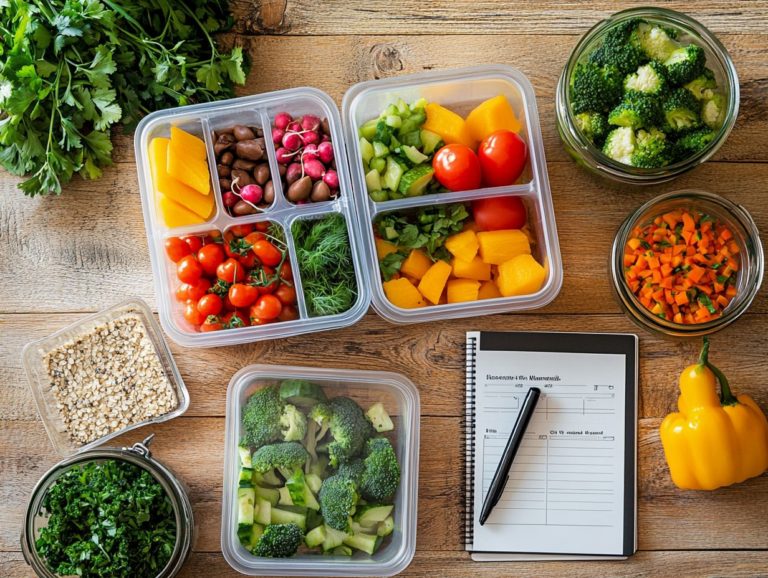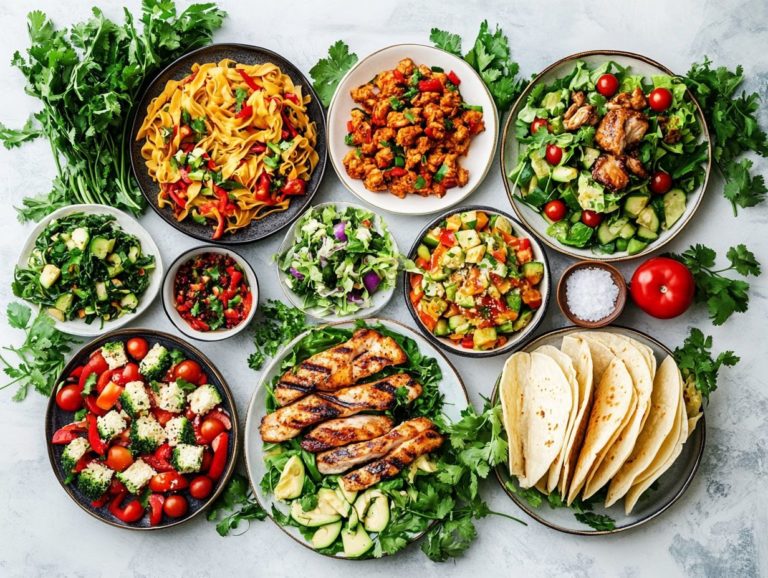5 Common Meal Planning Mistakes to Avoid
Meal planning can truly transform your approach to a healthy lifestyle. However, many find themselves tripping over common pitfalls that diminish their efforts.
Overlooking dietary restrictions, neglecting the importance of variety, and failing to budget effectively can all lead to setbacks in even the most well-meaning plans.
Let s dive into five common meal planning mistakes you should avoid. We ll highlight the significance of effective meal planning and illustrate how it can save you both time and money while supporting your wellness goals.
Prepare to uncover practical tips and ideas that will elevate your meal planning journey!
Contents
- Key Takeaways:
- 1. Not Considering Dietary Restrictions and Preferences
- 2. Not Planning for Leftovers
- 3. Not Taking Advantage of Seasonal Produce
- 4. Not Having a Variety of Meals
- 5. Not Taking Budget into Consideration
- Why Is Meal Planning Important for a Healthy Lifestyle?
- How Can Meal Planning Save Time and Money?
- What Are Some Tips for Successful Meal Planning?
- How Can Meal Planning Help with Weight Management?
- What Are Some Healthy Meal Planning Ideas?
- Frequently Asked Questions
- What are the 5 common meal planning mistakes to avoid?
- How can not setting realistic goals affect meal planning?
- Why is including variety in meals important in meal planning?
- What are some consequences of not considering portion sizes in meal planning?
- How can planning for leftovers benefit meal planning?
- Why is it important to account for dietary restrictions or preferences in meal planning?
Key Takeaways:

- Consider dietary restrictions and preferences to ensure meals are enjoyable and suitable for everyone.
- Plan for leftovers to save time and money, and reduce food waste.
- Take advantage of seasonal produce for fresher and more cost-effective meals.
1. Not Considering Dietary Restrictions and Preferences
Ignoring dietary restrictions and personal preferences in meal preparation can lead to unhealthy eating habits, food waste, and frustration during family meals. Using the right tools, such as 5 essential tools for successful meal planning, can help unblock your journey to a balanced diet and a healthier lifestyle.
Recognizing various dietary needs whether they come from allergies or lifestyle choices like vegetarianism, veganism, or gluten-free diets is essential for crafting meals that cater to everyone s tastes. By thoughtfully incorporating these considerations into your planning, you can streamline the meal prep process and cut down on the time spent guessing which ingredients will please all palates.
This mindful approach enhances the dining experience for everyone involved and nurtures a healthier relationship with food, promoting more intentional eating habits. Being attuned to everyone s dietary preferences not only reduces waste but also ensures that meals are tailored to accommodate those specific needs.
2. Not Planning for Leftovers
Failing to plan for leftovers can seriously undermine the efficiency of your meal prep. To avoid this, consider following 5 tips for planning balanced meals, which can help reduce wasted food and create quick, healthy meals throughout the week.
By intentionally preparing meals with the idea of yielding extra servings, you can streamline the cooking process significantly. This approach maximizes your time in the kitchen and sparks creativity, as those extras can be transformed into entirely different dishes.
For instance, think about a roasted chicken: it can serve as the foundation for salads, sandwiches, or stir-fries. This foresight minimizes food waste and opens the door to convenient, nutritious snacks or family dinners, ensuring that wholesome meals are always within reach when life gets hectic.
3. Not Taking Advantage of Seasonal Produce
Neglecting to incorporate seasonal produce into your meal planning limits your recipe repertoire and inflates your grocery expenses, impacting both your budget and nutritional choices.
By choosing fruits and vegetables that are in season, you can indulge in fresh flavors that simply outshine their out-of-season counterparts. Seasonal options are typically fresher, more flavorful, and easier on your wallet since they are abundant and locally sourced.
To reap these benefits, consider creating a food inventory that showcases the available produce throughout the year. This strategy allows you to craft meals that embrace variety, creativity, and nutrition while minimizing waste. Not only does this approach foster healthier eating habits, but it also supports local farmers and opens the door to exciting culinary discoveries, transforming meal prep into an enjoyable and rewarding experience.
4. Not Having a Variety of Meals

A lack of meal variety in your weekly prep can lead to boredom. This makes it hard to stick to your healthy eating goals.
Incorporate a diverse range of recipes and cooking techniques. Explore different cuisines or seasonal ingredients to transform basic items into exciting dishes.
A simple stir-fry can become a zesty Thai dish or a savory Chinese meal by just changing the sauce. Use herbs and spices to boost flavors without adding extra cooking time.
Try different cooking methods like grilling, steaming, or roasting to keep meals interesting and prep simple.
5. Not Taking Budget into Consideration
Ignoring your budget while planning meals can lead to overspending at the grocery store. To avoid this, consider implementing 5 strategies for last-minute meal planning, which can help improve your meal prep efficiency and make it easier to maintain healthy habits.
Craft a budget-friendly meal prep strategy by assessing your pantry and fridge. This ensures you don t miss any existing ingredients.
Create a detailed shopping list based on your recipes for the week. This helps avoid impulse purchases that can inflate your costs.
Choose seasonal produce to cut expenses and enhance flavor and nutrition. Using grocery delivery services simplifies the process, letting you compare prices easily.
This thoughtful grocery shopping approach promotes financial savings and creates a more organized meal prep routine.
Why Is Meal Planning Important for a Healthy Lifestyle?
Meal planning is crucial for cultivating healthy habits and managing stress. It helps you control your eating patterns and make informed choices about what you consume.
Establish a structured approach to daily meals. This eliminates the chaos of last-minute cooking and the temptation to dine out.
Regular meal planning makes it easier to include a variety of nutrients in your diet. This supports your long-term health and well-being.
Over time, consistent meal planning leads to a greater sense of accomplishment and a more positive relationship with food.
What Are the Benefits of Meal Planning?
Meal planning has many advantages. It allows you to prepare healthy meals in advance and enjoy delightful snacks while staying accountable to your nutrition goals.
It improves health outcomes by making nutritious ingredients a staple in your meals. Curbing impulse purchases also saves money and reduces food waste significantly.
Meal planning cultivates consistency, making it easier to stick to nutritional goals. Balancing macronutrients the nutrients your body needs in larger amounts, like proteins, fats, and carbohydrates and controlling portion sizes boosts your energy levels, enhancing overall well-being.
How Can Meal Planning Save Time and Money?

Effective meal planning can be a game changer for saving both time and money. By streamlining your grocery shopping, optimizing your cooking time, and curbing those impulsive purchases at the store, you can transform your cooking experience.
Incorporate practical strategies, like organizing a food inventory. This simple step helps you keep track of what ingredients you already have, allowing you to avoid unnecessary duplication. You can also use grocery lists; this ensures your shopping trips are focused and helps you stick to your budget by prioritizing essential items over those tempting impulse buys.
By scheduling dedicated meal prep time, you can whip up multiple meals at once, ensuring nutritious options are always at your fingertips throughout the week. This approach minimizes your reliance on takeout and paves the way for a healthier lifestyle.
What Are Some Tips for Successful Meal Planning?
Successful meal planning becomes a breeze when you embrace strategic tips and effective cooking techniques. For instance, adopting 5 easy meal planning tips for busy parents can help you commit to preparing healthy recipes over the weekend, equipping you for the busy week ahead.
Set aside a few hours on Sunday to chop vegetables, cook grains, and even batch-cook proteins, which means cooking large amounts at once. This way, you can mix and match throughout the week, making meal prep feel effortless. Embrace cooking techniques like steaming, saut ing, and slow-cooking to create a variety of textures and flavors while minimizing your time in the kitchen.
Diversifying your recipe repertoire is a smart move. Include dishes that cater to various dietary preferences, such as vegan stir-fries or gluten-free quinoa salads, allowing everyone in your household to enjoy delicious meals without compromise.
How Can Meal Planning Help with Weight Management?
Meal planning can truly change the game for your weight management journey. It promotes portion control, encourages a balanced diet, and keeps you focused on your nutritional goals.
By planning your meals in advance, you can sidestep those impulsive food choices that often lead to overeating. This intentional approach nurtures healthier eating habits and enables you to craft meals that are nutritionally diverse.
Take Sarah, for example a busy mother of two. She found that meal prepping every Sunday revolutionized her family s eating habits. By tracking portion sizes and integrating more fruits and vegetables into their meals, she celebrated a steady weight loss of 10 pounds over three months.
Then there s John, a fitness enthusiast, who discovered that organized meal plans not only fueled his workouts but also eliminated unhealthy snacking. This led to impressive results in his fitness journey.
These stories highlight the remarkable influence of thoughtful meal planning and portion control on reaching your health goals.
What Are Some Healthy Meal Planning Ideas?
Creative and nutritious meal planning ideas can transform healthy eating into a delightful experience. To support your goals, consider exploring 5 meal planning tips for weight gain, including options for snack preparation, utilizing frozen meals, and ensuring your meals remain varied throughout the week.
As you explore diverse cuisines, you ll discover effortless recipes catering to a range of dietary needs, from vegan and gluten-free options to those designed for high-protein diets. Adding versatile ingredients like quinoa and chickpeas boosts nutritional value and infuses your dishes with vibrant flavors.
Set aside a couple of hours each week for meal prep to dramatically cut down cooking time during busy days, allowing you to quickly assemble wholesome dishes. This approach opens the door to trying new recipes and creative snack ideas, such as homemade energy bites or yogurt parfaits, keeping your energy levels high and cravings in check.
Frequently Asked Questions

Ready to dive into meal planning? Let’s get started today!
What are the 5 common meal planning mistakes to avoid?
Here are five common meal planning mistakes to avoid:
1. Not setting realistic goals.
2. Not including variety in meals.
3. Not considering portion sizes.
4. Not planning for leftovers.
5. Not accounting for dietary restrictions or preferences.
How can not setting realistic goals affect meal planning?
Not setting realistic goals can lead to stress and letdowns when trying to stick to a meal plan. Consider factors like time, budget, and personal preferences when setting your goals.
Why is including variety in meals important in meal planning?
Including variety ensures you get healthy meals. Eating the same foods every day leads to boredom and makes it hard to stick to your plan.
What are some consequences of not considering portion sizes in meal planning?
Not considering portion sizes can lead to overeating and consuming more calories than intended. Portion out meals and snacks to maintain a healthy diet.
How can planning for leftovers benefit meal planning?
Planning for leftovers saves time and money. It also reduces food waste and allows you to create exciting new meals.
Why is it important to account for dietary restrictions or preferences in meal planning?
Account for dietary restrictions to ensure everyone enjoys the meal. This helps avoid allergy flare-ups and keeps everyone happy!






